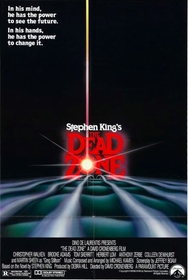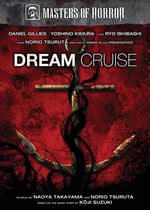Our editor-in-chief Nate Yapp is proud to have contributed to the new book Hidden Horror: A Celebration of 101 Underrated and Overlooked Fright Flicks, edited by Aaron Christensen. Another contributors include Anthony Timpone, B.J. Colangelo, Dave Alexander, Classic-Horror.com's own Robert C. Ring and John W. Bowen. Pick up a copy today from Amazon.com!
The Dead Zone (1983)
The Dead Zone is a rare film that manages to be both a great literary adaptation, and a strong film on its own terms. Adapted from a best-selling novel by Stephen King and directed by David Cronenberg, one might easily expect the film to be extremely disturbing and unrelenting in its depiction of graphic violence and bodily horrors, making it marketable only to hardcore horror fans. Instead, The Dead Zone is an understated piece of work with a near absence of violence and gore that still manages to be compelling, thought provoking, and accessible to mainstream moviegoers.
The Dead Zone tells the story of school teacher Johnny Smith (Christopher Walken) who while driving home late one night, gets involved in a car accident that leaves him comatose. Five years later, he awakens to find his once perfect life ruined. His girlfriend Sarah (Brooke Adams) has married another man, he’s lost his job, and his legs have become nearly paralyzed. He also discovers that he now has the ability to see into a person’s past or future, simply by touching their hand. At first, he sees this as a curse, while everyone else sees it as a blessing. Ultimately, Smith begins to use this gift of his as a way to prevent tragic events from coming true. Instead of following a straightforward plot, the film is slightly episodic with Smith trying to stop three separate tragedies from coming true.
David Cronenberg has always been interested in the human body and how it can destroy us, and The Dead Zone is a continuation of this theme, but in a way that is slightly different from his previous films. Here, it’s the frailty of the body that Cronenberg is after, rather than the horror. Specifically, the frailty of Johnny Smith’s body as his power takes an eventual toll on him, draining him of his strength and turning him into a near-recluse. Unlike most of Cronenberg’s films, there is a near absence of gore which makes sense since the tone of the film is more about atmosphere and character development.
Visually, Cronenberg conveys this through a winter landscape that reflects the mood of the film. It’s a desolate landscape of utter cold and miles of snow that perfectly encapsulates everything that needs to emotionally be said. Just from looking at it, one can sense a great deal of impending death and melancholy hovers over the entire film and everyone in it; which is reflective of what Smith is going through. This however is the only real visual style that is brought to the film as Cronenberg shoots the rest of the film as a traditional narrative drama, paying close attention to the actors and story. Which to be honest, is probably the wise choice. While the acting in previous films such as Rabid and Shivers wasn’t always of great caliber, The Dead Zone is an improvement and shows that he can get strong performances out of the actors.
Christopher Walken, who has since gained a reputation for playing eccentric characters, gives one of his best performances as Johnny Smith. He shows that he’s an actor who can communicate sadness, frustration, and unease through body language and facial expressions. This is especially evident during the moments when he sees into a person’s past or future. His face and eyes begin to twitch as if he’s going into shock and then pries himself away from the subject as he comes to the startling realization of what will happen, which is terrifying to him -- as it would be to anyone who could only see horrible events about to come. Over the course of the film, Walken’s performance as Johnny Smith evolves from a somewhat introverted character, frightened by his new ability, into a much stronger one who makes a courageous sacrifice to prevent the worst kind of tragedy from coming true. It’s a terrific performance that makes you wonder why he hasn’t been given more starring roles, rather than simply playing small or supporting ones.
Another standout performance comes from Martin Sheen, who plays the two-faced, everyman senatorial candidate Greg Stillson. Stillson is the true villain of the film; a man who will stop at nothing to achieve his ultimate vision of becoming president of the United States. It’s a slimy, despicable character and one that Sheen plays with obvious relish and delight, which is surprising given the fact that he has always, with the exception of Badlands, played heroic, noble characters. On the surface, Sheen’s performance as Stillson is charismatic and filled with good intentions, but when in private he shows himself to be dangerous and conniving. It is this performance and character that lends the film a political nature that underlies Cronenberg’s study of human frailty.
That political nature is of course, the question of would assassination ever be justifiable? After Johnny touches Stillson’s hand at a political rally, he sees a future where Stillson, having become president, sets off a catastrophic event that will doom the rest of the world. It is this vision that forces Smith to take drastic action and put an end to Stillson before he can ever become the next president. He compares his actions to a question he asks his doctor, Sam Weizak (Herbert Lom), that if you could go back in time and stop Hitler before he came to power, would you kill him? It is this philosophical question that goes right to the core of The Dead Zone’s politics concerning assassination. If you knew how the future turned out and could change it, no matter what cost, would you do it?
Ultimately, The Dead Zone will satisfy both mainstream moviegoers and David Cronenberg fans. The film has enough narrative storytelling and political commentary that appeals to non-horror fans and enough of the thematic concerns that Cronenberg fans expect. It may not resemble a typical Cronenberg film from the look and tone of it, but rest assured if you take a closer look, you’ll find that it fits into his body of work rather well.








